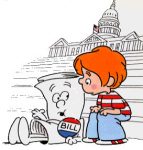To round out our federal reform review, we look at the bills introduced into the 115th Congress that attempt to resolve the banking and taxation problems faced by state-legal cannabis businesses. As this is perhaps the biggest thorn in the side of the cannabis industry, any movement by the feds on these issues will be welcomed. As it turns out, there are four proposals currently pending for fixing the broken cannabis financial services system, with each proposal comprising a pair of House-Senate companion bills. We look at each pair in turn.
Group 1
S. 1156 – SAFE Act; or, Secure and Fair Enforcement Banking Act
HR. 2215 – SAFE Act; or, Secure and Fair Enforcement Banking Act
Policy: These SAFE Acts would prohibit federal prosecutors and federal regulators from preventing or disciplining in any way a depository institution simply because that depository institution serviced a cannabis-related business.
Impact: The impact of these bills would be widespread for both the cannabis industry and for financial service institutions looking to capitalize on the cannabis industry. For banks, the bills would remove all of the barrier-risks that are now keeping them out of the cannabis business. Currently, the feds have handed down policy guidance to banks stating that as long as they submit what are called “Suspicious Activity Reports, or “SARs” for cannabis-related accounts, and conduct their due diligence to ensure such accounts are complying with state law, then those banks will not be pursued by federal law enforcement. The problem with this guidance is that it is only policy, it is not law, and so it can change on as little as an administrative whim. The protection from cannabis business risk, most banks have determined, is therefore temporary at best and illusory at worst. Passage of the SAFE Act would instantly change all of that and initiate a banking bonanza. Banks will be racing to profit off of what is amounting to a newly minted billion dollar industry. Cannabis businesses will benefit greatly from all of this. Not only will they be able to stop operating strictly in cash and have access to all the traditional financial services that other businesses heavily rely on, but they will also be the beneficiaries of a highly competitive, and therefore affordable and efficient, cannabis banking market.
Procedural Status:
S. 1156
- Introduced: May 17, 2017 by Senator Jeff Merkley (D-OR)
- Cosponsors: 3 Republicans, 7 Democrats, 1 Independent
- Referred to Senate Committee on:
- Banking, Housing, and Urban Affairs
HR. 2215
- Introduced: April 27, 2017 by Representative Ed Perlmutter (D-CO)
- Cosponsors: 7 Republicans, 44 Democrats
- Referred to House Committees on:
- Judiciary
- Subcommittee on Crime, Terrorism, Homeland Security, and Investigations
- Financial Services
- Judiciary
Group 2
S777 – Small Business Tax Equity Act of 2017
HR 1810 – Small Business Tax Equity Act of 2017
Policy: These bills would carve out an exception to IRC 280E allowing cannabis businesses to deduct ordinary business expenses from their federally taxable revenues.
Impact: If enacted these bills will dramatically ease the tax burden for cannabis businesses. Currently, even when they are in perfect compliance with state law, cannabis businesses are not permitted to deduct ordinary business expenses. This means that net taxable revenues are, and are going to continue to be, substantially higher than net taxable revenues for businesses in any other industry. If enacted, profit margins—and therefore product quality, operational efficiency and innovation—are going to uptick across all states that have legalized.
Procedural Status:

Image: JD Lasica, Flickr
S. 777
- Introduced: March 30, 2017 by Senator Ron Wyden (D-OR)
- Cosponsors: 1 Republican, 4 Democrats
- Referred to Senate Committee on:
- Finance
HR. 1810
- Introduced: March 30, 2017 by Representative Carlos Curbelo (R-FL)
- Cosponsors: 10 Republicans, 24 Democrats
- Referred to House Committee on:
- Ways and Means
Group 3
S. 780 – Responsibly Addressing the Marijuana Policy Gap Act of 2017
HR. 1824 – Responsibly Addressing the Marijuana Policy Gap Act of 2017
Policy: These bills combine to accomplish what each of the foregoing pairs accomplish separately. IRC 280E would no longer apply to state-legal cannabis businesses, and banking would become available for them as well. Additionally, advertising prohibitions in the CSA and the Communications act of 1934 would be removed, with the one exception that advertisements inducing travel from a state where cannabis is not legal to a legal cannabis state would be prohibited. Under Title II of the acts, barriers to federal bankruptcy proceedings would be removed. These bills would also reform the CSA as it relates to criminal liability for individuals, criminal record expungement and medical research for institutions, all of which are noteworthy but neither of which directly impact the legal cannabis industry.
Impact: For the impact of IRC reform, see “Impact” section under S.777/HR.180. For the impact of banking reform, see “Impact” section under S.1156/HR/2215.
By leaving advertising guidelines completely up to the states, we would probably witness the easing of advertising restrictions by the states. Currently, states have tight advertising rules because, after protecting consumers, they do not want their state’s legal cannabis industry to draw attention from the feds in any way. That concern would become moot and we could see more advertising in and across legalized states. This would drive competition across larger markets, in terms of both product and service quality and branding/marketing strategy.
Access to federal bankruptcy proceedings would clarify the landscape for all potential financial scenarios in the lifecycle of cannabis businesses, which in turn will ease uncertainty concerns of potential investors. The bankruptcy provision, combined with the banking provisions will undoubtedly open access to capital for cannabis businesses looking to grow operations and market presence.
Procedural Status:
S. 780
- Introduced: March 30, 2017 by Senator Ron Wyden (D-OR)
- Cosponsors: None
- Referred to Senate Committee on:
- Finance
HR. 1824

Photo: Bridget Baker, 92bridges.com
- Introduced: March 30, 2017 by Representative Earl Blumenaur (D-OR)
- Cosponsors: 0 Republicans, 8 Democrats
- Referred to House Committees on:
- Judiciary
- Crime, Terrorism, Homeland Security, and Investigations
- Regulatory Reform, Commercial and Antitrust Law
- Immigration and Border Security
- Energy & Commerce
- Health
- Ways and Means
- Financial Services
- Natural Resources
- Indian, Insular, and Alaskan Affairs
- Education and the Workforce
- Veterans’ Affairs
- Health
- Oversight and Government Reform
- Judiciary
Group 4
S. 776 – Marijuana Revenue and Regulation Act
HR. 1823 – Marijuana Revenue and Regulation Act
Policy: Subchapters A and B of these bills would impose two additional federal tax requirements on cannabis businesses. The first would be an excise tax on all producers, beginning at a rate of 10%, and growing each year that a producer is in business to a cap of 25% at five years. The second tax would be an occupational tax of $1,000 per year, to be paid by the principals of any cannabis producer or warehouse proprietor. Significantly, these bills would also authorize the federal government to regulate operations in the industry.
Impact: The tax impact of these bills would be a straightforward additional tax that cannabis businesses would have to pay, on top of state and local taxes. The burden of additional taxes will inevitably impact profit margins, initial decisions on whether or not to enter the market and strategies for expansion and innovation. The impacts of federal authorization and regulatory requirements was discussed in the second article of the series, specifically under the “Impact” section of HR1841
Procedural Status:
S. 776
- Introduced: March 30, 2017 by Senator Ron Wyden (D-OR)
- Cosponsors: None
- Referred to Senate Committee on:
- Finance
HR. 1823
- Introduced: March 30, 2017 by Representative Earl Blumenaur (D-OR)
- Cosponsors: 0 Republicans, 8 Democrats
- Referred to House Committee on:
- Ways and Means




